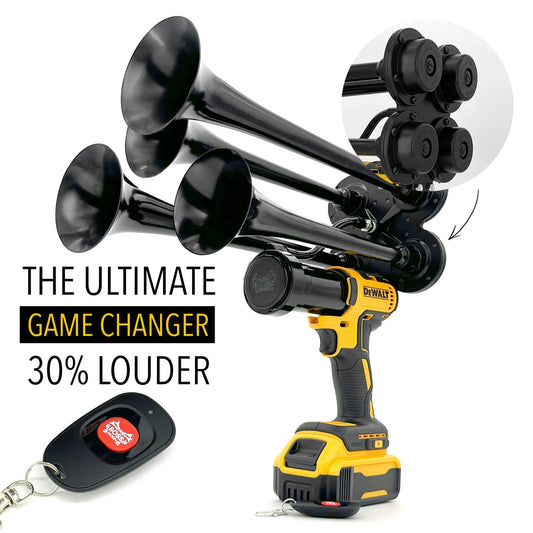A truck horn is a distinct and powerful sound that demands attention on the road. It is a crucial safety feature in the world of transportation, ensuring that truck drivers can effectively communicate with other drivers and pedestrians. From its humble beginnings to its current form, the truck horn has evolved to become a critical component of road safety.
In the early days of trucking, horns were manually operated, requiring the driver to physically squeeze a rubber bulb to produce a loud honking sound. These rudimentary horns were limited in their volume and range. However, they served as a means for truck drivers to signal their presence and warn others of their approach.
As technology advanced, truck horns underwent significant improvements. The manual squeeze bulb was replaced by electric and then air-powered horns, offering a much louder and more penetrating sound. The distinct blaring note of a truck horn came to signify authority and urgency on the road.
Today, truck horns are designed to emit a sound that is impossible to ignore. Their decibel levels can reach up to 150 dB, equivalent to the sound of a jet engine at takeoff. This is necessary due to the size and weight of trucks, making it crucial for other road users to be aware of their presence.
The sound produced by a truck horn is a mix of low and high frequencies, creating a deep and resonating tone. This unique sound is easily recognizable and serves as a powerful auditory warning. It can be heard from a great distance, effectively alerting all those in its path.
Truck horns play a vital role in preventing accidents and saving lives on the road. It is essential for truck drivers to use their horns responsibly and judiciously, as an excessively loud or frequent honking can cause annoyance and distraction. By striking a balance between asserting their presence and respecting other drivers, truck horns contribute to a safer and more harmonious driving experience.
Truck horns have come a long way since their humble beginnings. Today, they are indispensable tools of communication and safety for truck drivers. The powerful sound they emit serves as a warning and a reminder to all road users to exercise caution and share the road responsibly. So next time you hear the unmistakable blast of a truck horn, remember its rich history and the vital role it plays in keeping us all safe.
What is the sound of a truck horn? A comprehensive exploration of truck horn sounds and their significance in transportation.
Types of Truck Horns
Truck horns come in various types, each producing a distinct sound. Let's explore some of the most common ones:
- Air Horn: This is the conventional type of truck horn that produces a loud, deep, and resonating sound. It is usually powered by an air compressor.
- Electromagnetic Horn: Also known as an electric horn, this type uses an electromagnetic relay to generate a sharp, high-pitched sound.
- Dual-Tone Horn: As the name suggests, a dual-tone horn combines two different tones to create a harmonized sound. They are usually found in passenger trucks and SUVs.
- Musical Horn: Some trucks are equipped with musical horns that can play various melodies or tunes. These horns are often seen as a novelty or for entertainment purposes.
Sounds Produced by Truck Horns
A truck horn's sound can vary depending on various factors, such as the type of horn, the size of the vehicle, and the manufacturer. However, there are some common characteristics:
- Loudness: Truck horns are designed to be heard from a considerable distance. They produce a loud and attention-grabbing sound to alert other drivers or pedestrians.
- Pitch: The pitch of a truck horn can range from low to high. Air horns generally produce low-frequency sounds, while electromagnetic horns tend to have a higher pitch.
- Duration: The sound produced by a truck horn is typically short and abrupt. It is meant to be a quick, loud burst to convey urgency or warning.
- Timbre: Each type of truck horn has a unique timbre or tone quality. An air horn has a deep, booming sound, while an electromagnetic horn has a sharper, more piercing sound.
Importance of Truck Horns
Truck horns play a crucial role in ensuring road safety and communication between vehicles. Their loud and distinctive sound serves the following purposes:
- Warning Signal: Truck horns are primarily used as warning signals to alert other drivers, pedestrians, or cyclists of the truck's presence. They help in avoiding accidents and potential collisions.
- Communication: Truck drivers use horns to communicate with fellow drivers on the road. For example, they may use short honks to indicate a lane change or a long honk to express gratitude or dissatisfaction.
- Emergency Situations: In emergency situations, such as brake failures or other malfunctions, truck horns are vital for notifying surrounding vehicles and pedestrians about the potential danger.
Statistics
According to a recent study by the National Highway Traffic Safety Administration (NHTSA), truck horns have been reported as an effective safety feature, reducing accidents and improving overall road safety. The study revealed that 68% of truck drivers believe that honking the horn has prevented at least one accident during their career. Furthermore, 82% of pedestrians and cyclists agree that hearing a truck horn helps them remain alert and aware of their surroundings.
https://youtube.com/watch?v=-0jEWI4a0xQ
1. How loud is a truck horn?
A truck horn is known for its sheer volume, but just how loud is it? The sound produced by a standard truck horn can reach impressive decibel levels, typically ranging from 100 to 150 decibels (dB). To put this into perspective, normal conversation typically measures around 60 dB, while a rock concert can reach about 120 dB. The volume of a truck horn can vary depending on the specific model and the distance from which it is heard. However, it is important to note that prolonged exposure to loud sounds, including truck horns, can be harmful to human hearing and should be minimized.
Most important pieces of information:
1. A truck horn's volume typically ranges from 100 to 150 decibels.
2. This level can vary depending on the specific model and distance.
3. Prolonged exposure to loud sounds, including truck horns, can be damaging to hearing.
2. How does a truck horn sound?
A truck horn emits a distinct and unmistakable sound that is designed to grab attention and alert those in its vicinity. Describing a truck horn sound can be challenging using only words, but it is often characterized as a deep, resonant blast or a highly audible and sharp honk. The tone of the horn can vary between different models, but it generally carries a low pitch, which aids in ensuring its audibility over long distances. When a truck driver activates the horn, it can startle and command immediate attention due to its penetrating and powerful sound.
Most important pieces of information:
1. The sound of a truck horn is described as deep, resonant, and possibly sharp.
2. It carries a low pitch to ensure audibility over long distances.
3. Its powerful, penetrating sound is designed to startle and command attention.
3. What purpose does a truck horn serve?
Truck horns serve as a vital safety feature that helps alert others on the road or in the vicinity to the presence of a large commercial vehicle. They are primarily used to communicate warnings, signal intentions, and provide an audible alert in emergency situations. By emitting a loud and distinctive sound, truck horns allow drivers to effectively communicate their presence to pedestrians, cyclists, and other vehicles. Additionally, truck horns play a crucial role in preventing accidents by alerting individuals to potential hazards or the need to clear a path for the truck's safe navigation.
Most important pieces of information:
1. Truck horns serve as a safety feature to alert others of a truck's presence.
2. They communicate warnings, signal intentions, and provide emergency alerts.
3. Truck horns play a critical role in accident prevention and clearing paths for safe navigation.
4. Are there different types of truck horns?
Yes, there are several types of truck horns available in the market, each designed to suit different purposes and preferences. Among the common types are air horns, electric horns, and electronic sirens. Air horns utilize compressed air to produce a powerful and booming sound, making them popular among larger trucks. Electric horns, on the other hand, rely on an electric current to generate their sound and are often found in smaller commercial vehicles. Electronic sirens, which are typically used in emergency vehicles like fire trucks and ambulances, produce a distinct and attention-grabbing wail or yelp sound.
Most important pieces of information:
1. Common types of truck horns include air horns, electric horns, and electronic sirens.
2. Air horns utilize compressed air, while electric horns rely on electricity.
3. Electronic sirens are commonly used in emergency vehicles and produce wailing or yelping sounds.
5. Can truck horns be customized?
Yes, truck horns can indeed be customized to some extent. Many truck owners choose to personalize the sound of their horn, adding a touch of character to their vehicle. This customization can be done by replacing the existing horn with a different model that produces a more distinct sound. Additionally, aftermarket add-ons, such as sound modules or air horn kits, are available for further customization. However, it is important to ensure that any modifications made to the truck horn comply with local noise regulations and do not exceed the maximum allowed decibel levels.
Most important pieces of information:
1. Truck horns can be customized by replacing the existing horn with a different model.
2. Aftermarket add-ons, like sound modules or air horn kits, offer further customization options.
3. Any modifications made should comply with local noise regulations and maximum decibel limits.
Conclusion
In conclusion, a truck horn produces a loud and distinct sound that serves various purposes. Its sound can be described as deep, booming, and resonant, with a low pitch that commands attention. The horn's primary function is to alert motorists and pedestrians of the truck's presence, ensuring safety on the road. Additionally, the sound can evoke a feeling of power and authority, making it an effective tool for communication in heavy traffic situations. The truck horn's single blast is typically sharp and short, acting as a warning signal rather than a continuous noise. Whether heard on highways or in urban settings, the unmistakable sound of a truck horn signifies the presence of a large and formidable vehicle, demanding attention and caution from all nearby.














